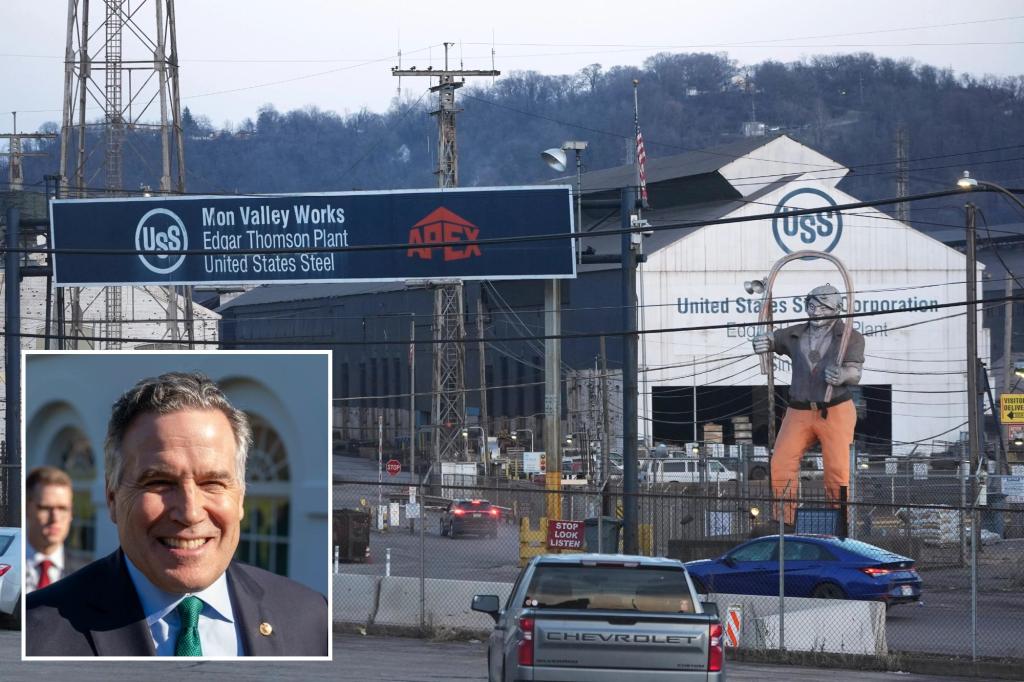Senator Ensures Strategic Control of US Steel Amid Nippon Acquisition
In a significant development for the American steel industry, a U.S. senator has publicly assured that crucial decision-making processes at US Steel will remain firmly in American hands, despite Nippon Steel’s upcoming acquisition of the company. This statement not only instills a sense of reassurance among American workers but also raises critical questions about the future competitiveness of the U.S. steel sector on the global stage.
The Context of the Acquisition
As Nippon Steel, one of Japan’s largest steel producers, prepares for its takeover of US Steel, industry analysts and political leaders alike are closely monitoring the implications of this move. The deal is part of a broader trend where foreign investments in American industries raise alarms about national security, job preservation, and economic sovereignty. With the steel industry being pivotal to infrastructure and defense, maintaining control over its operations has become increasingly essential.
Implications for the American Steel Industry
US Steel, founded in 1901, has long been a cornerstone of the American manufacturing landscape. However, the industry has faced numerous challenges in recent years, including overcapacity, fluctuating demand, and competition from low-cost foreign producers. The assurance from the senator highlights the U.S. government’s intent to protect its key industries amidst these challenges.
According to the senator’s statement, “It is imperative that the strategic decisions affecting our steel industry remain in American hands to ensure our economic security and global competitiveness.” This sentiment reflects a growing concern over foreign ownership of critical infrastructure and resources, particularly in an era marked by geopolitical tensions.
Challenges Ahead for US Steel
Despite the senator’s assurances, the acquisition by Nippon Steel poses several challenges for US Steel and the broader industry. Analysts warn that while foreign investment can bring capital and innovation, it may also lead to shifts in operational priorities that do not align with American interests.
- Job Security: With the potential for restructuring under new ownership, employees may face uncertainties regarding job security and workplace culture.
- Investment Priorities: There are concerns that Nippon Steel may prioritize profits over innovation or environmental sustainability, which could adversely affect U.S. operations.
- Market Position: The integration of Nippon Steel’s global strategies may alter US Steel’s market positioning, influencing pricing and competitiveness.
Political and Economic Reactions
The senator’s remarks have elicited varied responses from political leaders and industry stakeholders. Some praise the commitment to maintaining American control, viewing it as a necessary step to safeguard national interests. Others, however, argue that embracing foreign investment could enhance the industry’s competitiveness through access to new technologies and markets.
Industry experts like Dr. Jane Miller, an economist specializing in manufacturing, noted, “While the preservation of American control is vital, we cannot ignore the potential benefits of international partnerships that can drive innovation and efficiency in the steel sector.” The balance between protectionism and globalization remains a contentious topic as stakeholders navigate the complexities of foreign investment.
Future Outlook for US Steel
Looking ahead, the landscape of the U.S. steel industry is poised for transformation. The acquisition by Nippon Steel may serve as a catalyst for strategic realignments, prompting U.S. companies to innovate and adapt to remain competitive.
Key factors that will influence the future include:
- Technological Advancements: The adoption of advanced manufacturing technologies, such as automation and green steel production, will be critical for enhancing productivity.
- Trade Policies: Future trade policies will play a significant role in determining the competitive landscape, impacting tariffs and import regulations.
- Environmental Regulations: Increasing environmental concerns may drive the industry towards sustainable practices, influencing operational decisions at both domestic and foreign-owned entities.
Conclusion
The senator’s assurance regarding the control of US Steel amid Nippon’s acquisition underscores the complexities faced by the American steel industry. As the sector grapples with both domestic and international pressures, the commitment to maintaining American oversight will be pivotal in shaping its future. The ongoing dialogue about foreign investment and its implications for national security, job preservation, and economic competitiveness will surely continue to evolve.
As stakeholders engage in this crucial discussion, it remains essential for consumers, workers, and policymakers to stay informed about the developments in the steel industry. The future of America’s steel sector is not only a matter of economic interest but also a reflection of the nation’s commitment to maintaining its industrial strength in an interconnected world.
Call to Action
To keep abreast of the latest developments in the steel industry and understand how these changes may affect you, subscribe to our newsletter or follow our updates on social media. Stay informed, and be part of the conversation about America’s industrial future.
See more Business Focus Insider Team

